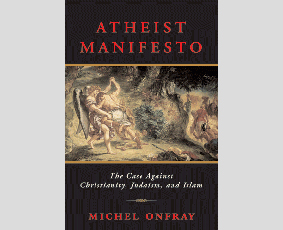It is a rare occasion when the translated title of a book matches its content better than the original, but there you go.
[Update 2011 March 8: I switched to a more recent edition—same content, different title: In Defense of Atheism: The Case Against Christianity, Judaism, and Islam. So the English translation finally matches the French edition’s original mismatch between content and title.]
The original title Traité d’athéologie : Physique de la métaphysique promises too much and suggests more breadth and depth than its 220 pages plus 25 pages bibliography actually deliver. The label “manifesto,” in contrast, fits Michel Onfray’s book rather well. But wait—that doesn’t mean I didn’t like it or wouldn’t recommend it! It offers a perspective that is distinctly different from those of the “Four Horsemen” Dawkins, Harris, Dennett, and Hitchens, and its rhetoric is abrasive in interesting ways, some “style over substance” sections notwithstanding. (The English translation, though, seems to be less elegant at times than the French original, at least according to some samples I checked.)
Here’s what’s different:
- Onfray is much more outspoken and aggressive against the respective cultures based on and engendered by religions. (Compare this with, e.g., Richard Dawkins’s self-description as a “cultural Christian.”)
- Onfray severely criticizes that we embrace and cherish exactly those thinkers from the Enlightenment and later periods who at least espoused deism and were, on the whole, deeply religious—while completely neglecting thinkers who were outspokenly non-deist or atheists. (Compare this to how many deist thinkers are espoused and anthologized by the “Four Horsemen.”)
- Onfray’s atheism, or a-theologism, is much broader in scope and explicitly directed against a wide range of contemporary ethics which are either not recognized as derived from Christian thought, and/or even actively disguised as “secular” ethics. (Besides more obvious examples, surreptitiously religious non-concepts such as “free will” also figure large.)
What makes Onfray’s text rather a “manifest” than a «physique de la métaphysique» is that sketches these points very well, but doesn’t elaborate on them. If more philosophical and historical scope and in-depth analysis had been employed in order to introduce explicitly non-deist, atheist philosophers, and to the development of truly secular ethical models, Onfray’s “treaty” might have—with a much higher page count—sold less and achieved more.
If you have something valuable to add or some interesting point to discuss, I’ll be looking forward to meeting you at Mastodon!

